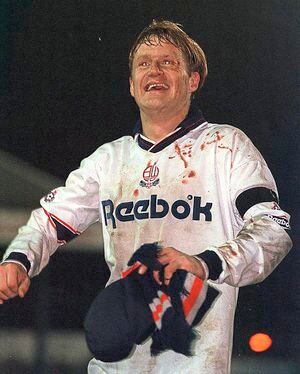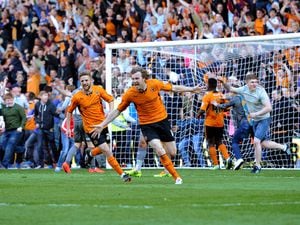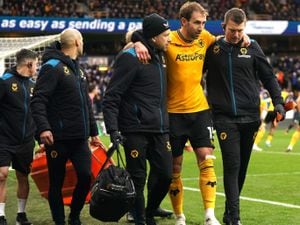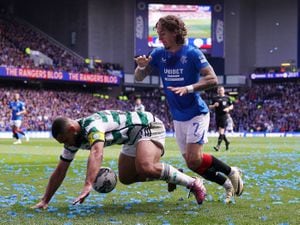Johnny Phillips: John McGinlay will always be villain of the piece
Graham Taylor, unable to hide the disappointment on his face, walked across the sodden turf.
Pointing to a couple of thousand despondent visiting fans on the crumbling terrace at Burnden Park, he urged his devastated Wolves players to applaud the travelling support before they headed to the sanctuary of the dressing rooms.
All around, Bolton’s players and fans were celebrating. None more so than their talisman in attack, John McGinlay, savouring the cheers of his adoring public.
Time is a healer, but those present in that away end, and the many more watching on a big screen back at Molineux, have never been able to purge the memory of that night 25 years ago this weekend. The First Division play-off semi-final second leg of May 17, 1995.
It was a match that had profound implications on the direction of the two clubs. A rivalry dating back to the glory days of the 1950s was reborn. It was a feud that became acrimonious. It took Wolves eight years, four managers and two more failed play-off attempts to return to the top division. By the time they arrived in the Premier League their hope of making a lasting impression had gone, while Bolton went on to enjoy the best days of their modern history.
The pantomime villain of the piece, for Wolves fans, was McGinlay. To understand any rivalry properly it is always worth hearing both sides of a story. The former Scotland international sighs as he answers my request to chat about that night a quarter of a century ago. He knows what is coming.
“Listen, I get pelters from Wolves fans whenever this comes up, I don’t really want any more.” Perhaps it is time to look back at that period through a more objective lens.
Ahead of the 1994/95 season, Bolton boss Bruce Rioch used his few pennies wisely to blend a group of young talents such as Alan Stubbs, Jason McAteer and Alan Thompson with senior pros like Gudni Bergsson, Neil McDonald, Owen Coyle and McGinlay. It was a contrast to Taylor’s expensively assembled Wolves side. Just three months earlier the Lancashire club handed out a 5-1 hammering to Wolves at Burnden Park.
Going into the play-offs Wolves appeared fragile – an injury crisis had hit – but they pulled out a brilliant first leg performance at Molineux, winning 2-1.
“We got battered, we really did,” McGinlay recalls. “If Wolves had taken their chances they would have had four or five. We had Peter Shilton (aged 45, deputising for the injured Keith Branagan) in goal that day. He made some great saves and I remember our defenders making some great blocks. Jason McAteer’s goal kept us in the tie, they could have been out of sight.”
McGinlay then levelled the aggregate score at 2-2 in the first half off the second leg at Burnden Park. Bolton held all the cards in extra-time, knowing that they would go through on the away goals rule (since abolished) if there was no further scoring. Then came the infamous fracas between the Scot and David Kelly.
“The way it happened was quite innocuous,” McGinlay continues. “A corner went to the far post and was knocked back across goal. Mike Stowell came for the ball and took it as one of the Wolves defenders pushed me on top of him. David actually grabbed me first and my reaction was to swing my arm and I connected. The referee was standing six yards away with an unobstructed view. Two thoughts flashed before me: Bruce Rioch is going to sack me and I won’t be able to play at Wembley. I tried to shake David’s hand and asked the referee not to spoil a good game. Then the referee showed us both a yellow card. There was no reason why he didn’t show me the red card, and David probably should have been shown one as well.”
Watching the incident back today, that view is backed up by the television footage which clearly shows Kelly made the first contact with his opponent’s face. They both remained on the pitch, and McGinlay scored his second of the night to seal Bolton’s passage to the final. From that moment on, a rivalry was stoked.
“If you read back into the history books there was a Nat Lofthouse, Billy Wright rivalry and respect, it was fostered back then,” McGinlay says. “It was revitalised in our era. It was just a great atmosphere whenever we played, whether at Burnden or Molineux.”
In January 1997, with Bolton back in the First Division, Mark McGhee’s promotion-chasing Wolves lost 3-0 in a game dubbed ‘The Battle of Burnden Park’ after a 22-man brawl which involved Steve Bull and Gerry Taggart attempting to headbutt each other, while other heavyweights like Dean Richards, Keith Curle, Jamie Pollock and Nathan Blake flexed their muscle. Even the Bolton mascot, Lofty the Lion, was reported to the FA for inciting the fans. Typically, McGinlay scored that day.

“We had got to the stage with Wolves, where it was just meant to be! They had tried everything to beat us, and they were kicking us that day, but we could scrap as well. I think that was an all-or-nothing game for them going for the title and they lost it that day.”
Bolton went on to win the First Division while Wolves would miss out in the play-offs once more. So did McGinlay relish his role as the arch adversary?
“The more stick I got the better I played. It was the first game we looked for back then. Maybe I didn’t always help myself, but I was just doing my job for the team. Some fans have taken it too far at times. I’ve been back to Molineux since and I get the odd threat.”
McGinlay is not looking to Wolverhampton for a sympathetic ear. He knows that his reputation was forged back in those fractious days when the two famous Wanderers fought tooth and nail on the pitch. By way of explaining just how far some fans are not prepared to let bygones be bygones he tells an amusing story.
“My cousin Stuart was a regional manager for a lift firm in Redditch a few years ago. He was interviewing a man for a job and they were going through his CV, just chatting. Stuart asked him if he liked football and the man said, ‘Yes, Wolves’. So Stuart said, ‘Oh right, my cousin is John McGinlay.’ The guy stood up, took his CV back and said, ‘I couldn’t f**king work for you!’ and walked out. It shows you how far some people would go.”
Football is cyclical. For many Wolves fans, the ghosts of Burnden Park were only truly laid to rest two years ago. 5,000 visiting fans turned one end of the Macron Stadium into a sea of gold and black as Nuno’s side clinched the Championship title with a resounding 4-0 win against a struggling Bolton. Under the ownership of Ken Anderson, who banned McGinlay from the club he loved for speaking up on behalf of the fans, administration soon followed.
“I can’t describe some of the times we’ve had, especially with one owner in particular,” McGinlay continues. “The only plan was to take as much out of the club as possible. It’s hard, it really is. We came so close to going out of business. I wish we had never left Burnden all those years ago, as we were the heartbeat of the town. The new stadium is stunning, but I wish we hadn’t left the town.”
Bolton supporters can now only glance on enviously at the route Wolves have taken in recent seasons.
“You see Wolves going from strength to strength, getting into Europe and challenging the top four,” McGinlay adds. “They are a fantastic team, with a great manager. The support has never been in question, they’ve always been fanatical, but the owners have built it up piece by piece. I think the only problem might be hanging on to the top players. I really like Raul Jimenez, he’s become more consistent as a goalscorer and there’s more to come from him. Ruben Neves can create something out of nothing. But the big thing is the team spirit they seem to have. We had that back in our day, and you can’t achieve anything without it.”
A generation on, the football of today’s Wolves feels a world away from those blood and thunder Burnden Park encounters. They were times that sparked a lingering bitterness. The antiquated visitors’ terrace was a dark place on May 17, 1995. No Wolves fan would ever want to return there. But it is nonetheless part of what makes us as football supporters. The memories. Good and bad.





